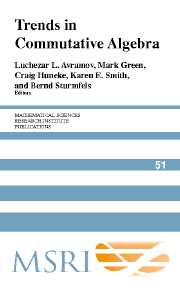Book contents
- Frontmatter
- Contents
- Preface
- Commutative Algebra in the Cohomology of Groups
- Modules and Cohomology over Group Algebras
- An Informal Introduction to Multiplier Ideals
- Lectures on the Geometry of Syzygies
- Commutative Algebra of n Points in the Plane
- Tight Closure Theory and Characteristic p Methods
- Monomial Ideals, Binomial Ideals, Polynomial Ideals
- Some Facts About Canonical Subalgebra Bases
Preface
Published online by Cambridge University Press: 06 July 2010
- Frontmatter
- Contents
- Preface
- Commutative Algebra in the Cohomology of Groups
- Modules and Cohomology over Group Algebras
- An Informal Introduction to Multiplier Ideals
- Lectures on the Geometry of Syzygies
- Commutative Algebra of n Points in the Plane
- Tight Closure Theory and Characteristic p Methods
- Monomial Ideals, Binomial Ideals, Polynomial Ideals
- Some Facts About Canonical Subalgebra Bases
Summary
Over the last fifteen years, commutative algebra has experienced a striking evolution. During this period the outlook of the subject has been altered, new connections to other areas have been established, and powerful techniques have been developed. To foster further development a year-long program on commutative algebra was held at MSRI during the 2002–03 academic year, starting with an introductory workshop on September 9–13, 2002. This workshop concentrated on the interplay and growing connections between commutative algebra and other areas, such as algebraic geometry, the cohomology of groups, and combinatorics.
Six main speakers each gave a series of three talks during the week: David Benson, David Eisenbud, Mark Haiman, Melvin Hochster, Rob Lazarsfeld, and Bernard Teissier. The workshop was very well attended, with more than 120 participants. Every series of main talks was supplemented by a discussion/talk session presented by a young researcher: Manuel Blickle, Ana Bravo, Srikanth Iyengar, Graham Leuschke, Ezra Miller, and Jessica Sidman. Each of these speakers has contributed a paper, or in some cases a combined paper, in this volume.
David Benson spoke on the cohomology of groups, presenting some of the many questions which are unanswered and which have a close relationship to modern commutative algebra. He gave us many convincing reasons for working in the “graded” commutative case, where signs are introduced when commuting elements of odd degree. Srikanth Iyengar gives background information for Benson's notes.
- Type
- Chapter
- Information
- Trends in Commutative Algebra , pp. ix - xPublisher: Cambridge University PressPrint publication year: 2004

